Vertex Media | 28th May 2023 |
The film, Ropoli, is a creation of the narratives of slavery in the 16th century that evolves around the village of Ropoli – a small settlement of mainly farmers and hunters. This all-Sierra Leonean film was released in 2017.
The film brings to light that slavery was not only done by foreign, rather, there were classic instances of how people were taken captives by their own fellow kinsmen. What many people knew about slavery then was that Westerns were the only slave masters, but in reality, the trade was also carried on by native Africans, who had the quest for power and the need to forcefully acquire vast lands and properties. To actualize this, they devise means of capturing their presumed subjects and conquered their territories.
Ropoli is a classic traditional African film gives an insight into what slavery looked like.
In the film, a village is taken into slavery and all their men captured, escaped, and returned to rescue their families but lost their king before they toppled their captives.
The Plot
In the film, native of the village of Ropoli, Pakitenae (the translator) who speaks the native language (Temne) and the language of the whiteman, was able to deceived his people that the whiteman was going to teach them some knowledge to be smarter. The white man introduced a match box and ignited it to produce fire, as opposed to their ancient means of rubbing stones to get fire. He also dissolved sugar in wine without changing it colour. The villagers, including their king, were amazed by these tricks and trusted them.

The whiteman and his aide Paketenae (the native translator) shared an induced whiskey with sleeping tabs to the hefty men and security guards, who eventually fell asleep, and they were captured and taken into slavery. The hefty were separated from the rest of the other slaves, and they were about to be sold to another slave master, which was unknown by their overall slave master, the whiteman.
On the other hand, the other Ropolians, together with their King and Princess (Sama), were subjected to some cruel treatments. Their king was humiliated and embarrassed. His daughter, Princess Sama, had to step in and defend themselves. They were already on the verge of being sold to a slave master known as Nfa Alie.
The hefty men, who were mainly farmers and hunters, realised they needed to go back to rescue their families and the king. They used itchy herbs to submerge their masters and killed them, and traced their people, the Ropolians. The hunter (known as ‘Okapra’) used his skills of sniffing leaves and grasses to trace the direction of their people, while the farmers who understand the soil better, tasted it to trace them as well.
The men found the Ropolians and rescued, but unfortunately, the king and the brother of Okapra had already been killed in the slave pit before they arrived.

After they were rescued, Princess Sama was able to use her skills of understanding the other tribes, and she was able to communicate with the Prince of Thayei, who speaks mende.
The Prince of Thayei, who was being held captive, was sold by his uncle without his knowledge. His uncle sold him into slavery in order to take over his kingdom, but he had no idea, thinking that his uncle was being killed after they were captured together. He later found out that he was sold into slavery.
The hefty men rescued them from the slave pit. The Princess was able to kill the translator, while she released the slavery master (Nfa Alie), believing that he would be a changed man. But, the aggrieved and embarrassed slave master decided to get revenge and hired the powerful Madingo missionaries to kill the Princess and her people and seize their lands.
After learning more about the missionaries, the Princess and her people separated themselves and took diverse directions, which made it difficult for the missionaries to subdue them. After a fight between the missionaries and the villagers, the missionaries realised that the Princess had already taken a different route, and it was her they wanted.
As they were about to trace the Princess, one of the missionaries had a vision that their grandfather was killed by the grandfather of Nfa Alie, the slave master who hired them to kill the villagers. They went back to kill Nfa Alie before they came back for the villagers.
But before they returned, the Princess and the herbs men (hunters and farmers) had already fortified the wounded men. They fought and eventually defeated the missionaries.

Characters
Producer and Lead Character (Princess Sama) was played by Zainab Sillah,
The Supporting Lead actor (Okapra) was played by Musa Ogini Dumbuya,
The Supporting Actress (Caregiver) was played by Anisa Munu,
The Supporting Actors (Pakitenae, the translator) was played by Taboliboli Kamara, and (Fonti, the farmer) was played by Musa Alimamy.
~~~~~~
Ropoli has already attracted huge global attention, having premiered in the United States, Burkina Faso, Nigeria, Spain, Portugal, Poland, South Africa, Ghana. The film has also won several awards in the United States, in the UK, Burkina Faso, Nigeria, Ghana, Spain, and Sierra Leone. Plus film scholarships in Spain and in the United Kingdom, as well.
Ropoli was directed by Joseph M. Fiamaple, and produced under the Spectree Film Production.
The film is one of the most well produced African movies, with a thrilling storyline, characterisation, and quality imagery. It’s a true narration and reflection of the long aged slave trade that was locally practised across Africa.
Sound and picture were also topnotch, which will stand the test of time, giving viewers a true feeling of the rich history of slavery trade and civilisation. The Temne and Mende languages of Sierra Leone were mainly used in the film.
By Ibrahim Sorious Samura
©️ www.vertexmedia.sl









